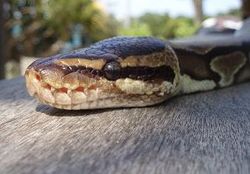Difference between revisions of "Royal Python"
Jump to navigation
Jump to search
| Line 1: | Line 1: | ||
| − | {{ | + | {{OpenPagesTop}} |
[[Image:Royalpython.jpg|250px|thumb|right|'''Royal python''' (Photo credit: Claire Porteous)]] | [[Image:Royalpython.jpg|250px|thumb|right|'''Royal python''' (Photo credit: Claire Porteous)]] | ||
==Introduction== | ==Introduction== | ||
| Line 15: | Line 15: | ||
*Veterinary considerations – They are not a particularly good pet because of problems with anorexia. | *Veterinary considerations – They are not a particularly good pet because of problems with anorexia. | ||
| − | == | + | {{Learning |
| − | + | |literature search = [http://www.cabdirect.org/search.html?q=(od:(Royal+Python)+OR+title:(Royal+Python)+OR+ab:(Royal+Python)+OR+od:(Python+regius)+OR+title:(Python+regius)+OR+ab:(Python+regius))&fq=sc:%22ve%22 Royal Python publications] | |
| + | }} | ||
| − | + | {{review}} | |
| − | + | ||
| − | + | {{OpenPages}} | |
Latest revision as of 17:01, 18 August 2012
Introduction
The royal or ball python (Python regius) is of the family Boidae.
Morphology
Royal pythons grow to over one metre in length and have a stumpy tail. They are irregularly darkish brown to black marked with large, irregular blotches (that have the appearance of aliens!). This colouring allows camouflage in dark soil and grass. Their life span in captivity may be up to 18 years.
Free-Living
- Distribution and habitat – Royal pythons come from the grasslands of western Africa
- Diet – Royal pythons primarily hunt and constrict grassland rodents.
Captivity
- Cage – Royal pythons are basically terrestrial but will climb branches.
- Temperature and humidity - Environmental requirements include a temperature range of 25-30°C and a humidity of 30-70%.
- Diet – Royal pythons will eat rodents in captivity. They normally fast from November/December for three to five months until February/March. See snake feeding
- Reproduction – Royal pythons are oviparous. The eggs have an incubation of about 75-80 days and the female coils around them
- Veterinary considerations – They are not a particularly good pet because of problems with anorexia.
| Royal Python Learning Resources | |
|---|---|
 Search for recent publications via CAB Abstract (CABI log in required) |
Royal Python publications |
| This article has been peer reviewed but is awaiting expert review. If you would like to help with this, please see more information about expert reviewing. |
Error in widget FBRecommend: unable to write file /var/www/wikivet.net/extensions/Widgets/compiled_templates/wrt69a5330eeaecd2_68835742 Error in widget google+: unable to write file /var/www/wikivet.net/extensions/Widgets/compiled_templates/wrt69a5330f0d5138_71716479 Error in widget TwitterTweet: unable to write file /var/www/wikivet.net/extensions/Widgets/compiled_templates/wrt69a5330f14ea99_77349384
|
| WikiVet® Introduction - Help WikiVet - Report a Problem |
